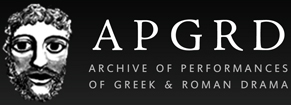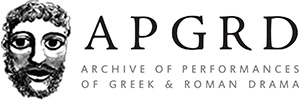The APGRD's 'Performing the Classics under Fascism' project explores the use of classical antiquity in the spectacularization of culture under fascist regimes.
The so-called ‘cultural turn’ in Fascist studies has recently shifted attention to the particular relationships that the different national variants of fascism had with modernism and to the peculiar symbiosis between past and present that served to create fascism’s narrative of national regeneration. Not unlike the pseudo-scholarly work of fascist classicists and historians, cultural production played an active role in demonstrating the historical and spiritual continuity with ancient Rome. At the same time, the revival of the classical past was an expression of Italian Fascism’s desire to modernise culture. This is evident in the way Italian Fascism deployed new media technologies, modernist architecture, and performance aesthetics in reimagining Rome and disseminating the cult of romanità, whilst rethinking the very meaning of the classical.
The project to date has explored the role of theatre, film, large-scale spectacles and their performative sites in reconceptualising the classical under fascist regimes, particularly in Fascist Italy and Nazi Germany, as well as having focused on the synergies between liveness and mediatisation in terms of cultural transmission. The project members have also reflected upon the practices of documentation and archiving of fascist regimes and their implications for the study of fascist art and culture. Researchers on this project have worked on APGRD’s Leyhausen-Spiess collection, which contains rich material relating to productions in Fascist Italy and Nazi Germany before the outbreak of WW2. Other collections and archival material that feature in this project are from the INDA (National Institute of Ancient Drama) Archives in Syracuse (Sicily), Laboratorio Dionysus (Trento), and Fondo Romagnoli at the Biblioteca Civica Tartarotti (Rovereto), archives with which members regularly collaborate.
Moving forward, we aim to investigate further the role of open-air performances of ancient Greek and Roman drama and festivals in fascist and para-fascist regimes by comparing their development in Italy, Greece, Portugal, Spain, and Argentina in the interwar period.
Publications
- G. Di Martino, E. Ioannidou and S. Troiani (eds.), A Hellenic Modernism: Greek Theatre and Italian Fascism, special issue of Classical Receptions Journal 16 (2024) 1.
- G. Di Martino, ‘The Ancient Greek Theatre Model and Italian Fascism. Performing Greek Tragedy in the Ancient Roman Theatre of Sabratha (1937-1938)’, in: S. Agbamu, E. Giusti (eds.), Classics and Italian Colonialism (forthcoming 2024: De Gruyter).
- E. Ioannidou, ‘Chorus and the Vaterland: Greek Tragedy and the Ideology of Choral Performance in Inter-War Germany’, in J. Billings, F. Budelmann and F. Macintosh (eds.), Choruses, Ancient and Modern, (Oxford University Press: 2013) 327-345.
- E. Ioannidou, G. Di Martino, and S. Troiani, eds., (Re)Living Greece and Rome: Performances of Classical Antiquity under Fascism, special issue of Fascism: Journal of Comparative Fascist Studies 12, No.2 (2023): 107-331.
Events
- Upcoming: Book launch: 5pm Outreach Room, Classics Faculty (Oxford, 29 February 2024)
- The Fascist Archive in Performance (Online, 15 January 2021)
- Classics and the Spectacular under Fascism (Oxford, 16 December 2019)
Resources
- G. Di Martino, Clasical Performances During the Ventennio (PDF) appendix table.
People
- Giovanna Di Martino (UCL)
- Eleftheria Ioannidou (Groningen)
- Sara Troiani (Coimbra - CECH)
- Fiona Macintosh (Oxford)
- Pantelis Michelakis (Bristol)


